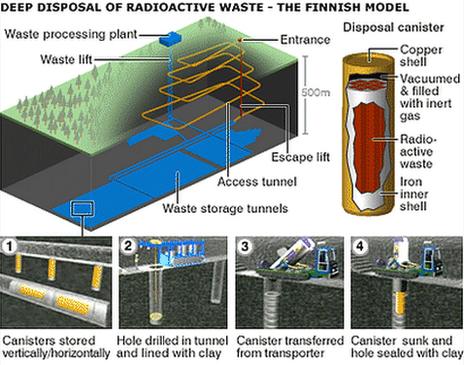Nuclear waste store gains public backing
- Published

Earlier attempts to bury the waste near Sellafield foundered on geological issues and public concern
The search for an underground storage site for high-level nuclear waste is likely to go ahead in Cumbria after a poll showed residents are in favour.
In Copeland, the local authority area encapsulating Sellafield, 68% of people backed entering formal talks with government on hosting the repository.
Across Cumbria as a whole, 53% are in favour and 33% opposed.
West Cumbria is the only region to show an interest in the repository; if talks fail, the UK has no "Plan B".
The poll, conducted by Ipsos Mori, is one element of a long consultation process being mounted by the West Cumbria Managing Radioactive Waste Safely Partnership.
This includes the three councils expressing an interest - Copeland and Allerdale Borough Councils along with Cumbria County Council - plus other stakeholders such as parish councils, churches and the National Farmers' Union.
The results were released at a meeting in Whitehaven along with more than 1,500 consultation responses sent in by individuals, organisations and schools, which are also <link> <caption>published on the partnership's website</caption> <url href="http://www.westcumbriamrws.org.uk/page/123/Consultation-Submissions.htm" platform="highweb"/> </link> .
Backing mandated
"We would like to thank people for taking part in this important opinion survey," said Tim Knowles, the partnership's chair and a county councillor.

Critics warn of safety and security concerns - but some want new nuclear reactors in Cumbria
"We have always made it clear that the views of local people are extremely important in this process."
When the government invited local authorities to volunteer to host the deep geological store back in 2006, it mandated that councils could not proceed in the face of opposition from local people.
This gave the Cumbrian poll, conducted on a sample of more than 3,000 people, real significance.
In Copeland, the numbers were 68% in favour and 23% against. In neighbouring Allerdale, the figures were 51% in favour and 37% against - virtually identical to the response from Cumbria as a whole.
Having evaluated the poll and the responses to its consultation exercise, the partnership will compile a report for the three key councils in the next few months.
A <link> <caption>draft summary of responses</caption> <url href="http://www.westcumbriamrws.org.uk/images/Consultation%20Initial%20Summary%20of%20Views%20DRAFT.pdf" platform="highweb"/> </link> reveals a variety of views.
A number were highly critical on grounds such as unsuitable geology and the possibility of a terrorist attack.
Some parish councils are opposing the scheme, with Bassenthwaite in the Lake District, for example, saying it is "completely unacceptable".
Finnish line
If the councils do decide to engage in a formal bid to host the repository, there will be more detailed geological research in the area to find a suitable rock formation.
Councils will also begin to discuss with government what compensation local communities should receive.
In Finland, which pioneered the "voluntarist" approach to storing high-level nuclear waste, residents at the selected site in Eurajoki requested and received several specifics including a new nuclear reactor, which is still being built.
The success of the approach means that Finland is likely to begin filling its geological repository around 2020, which would make it the first country in the world to find a long-term solution for its nuclear legacy.
If the Cumbrian councils do enter talks, they will retain the right to to pull out for many years, and the first waste would not enter the site until about 2040.
The technology is likely to resemble the approach developed in Scandinavia, in which highly radioactive material is encased in steel and copper and sealed in water-resistant clay inside rock.
The government decided in 2006 that deep geological disposal was the best solution for the UK's high-level nuclear waste, which is currently held in surface-level stores at nuclear power stations and other sites around the country.
But it also insisted in a voluntarist approach, as previous attempts to find a storage solution failed through local opposition.
Nowhere else in the UK has offered itself as a candidate site, though a council in Kent <link> <caption>has recently begun to express interest</caption> <url href="http://www.bbc.co.uk/news/uk-england-kent-18086988" platform="highweb"/> </link> .

The storage system would probably mimic the approach developed in Scandinavia
Follow Richard <link> <caption>on Twitter</caption> <url href="http://twitter.com/#!/BBCRBlack" platform="highweb"/> </link>
- Published16 May 2012
- Published23 March 2012
- Published16 March 2012
- Published21 September 2010